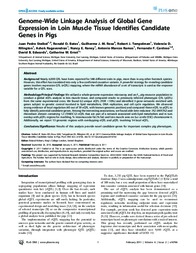Genome-wide linkage analysis of global gene expression in loin muscle tissue identifies candidate genes in pigs.
Genome-wide linkage analysis of global gene expression in loin muscle tissue identifies candidate genes in pigs.
Author(s): STEIBEL, J. P.; BATES, R. O.; ROSA, G. J. M.; TEMPELMAN, R. J.; RILINGTON, V. D.; RAGAVENDRAN, A.; RANEY, NANCY E.; RAMOS, A. M.; CARDOSO, F. F.; EDWARDS, D. B.; ERNST, C. W.
Summary: Background: Nearly 6,000 QTL have been reported for 588 different traits in pigs, more than in any other livestock species. However, this effort has translated into only a few confirmed causative variants. A powerful strategy for revealing candidate genes involves expression QTL (eQTL) mapping, where the mRNA abundance of a set of transcripts is used as the response variable for a QTL scan. Methodology/Principal Findings: We utilized a whole genome expression microarray and an F2 pig resource population to conduct a global eQTL analysis in loin muscle tissue, and compared results to previously inferred phenotypic QTL (pQTL) from the same experimental cross. We found 62 unique eQTL (FDR ,10%) and identified 3 gene networks enriched with genes subject to genetic control involved in lipid metabolism, DNA replication, and cell cycle regulation. We observed strong evidence of local regulation (40 out of 59 eQTL with known genomic position) and compared these eQTL to pQTL to help identify potential candidate genes. Among the interesting associations, we found aldo-keto reductase 7A2 (AKR7A2) and thioredoxin domain containing 12 (TXNDC12) eQTL that are part of a network associated with lipid metabolism and in turn overlap with pQTL regions for marbling, % intramuscular fat (% fat) and loin muscle area on Sus scrofa (SSC) chromosome 6. Additionally, we report 13 genomic regions with overlapping eQTL and pQTL involving 14 local eQTL. Conclusions/Significance: Results of this analysis provide novel candidate genes for important complex pig phenotypes.
Publication year: 2011
Types of publication: Journal article
Observation
Some of Embrapa's publications are published as ePub files. To read them, use or download one of the following free software options to your computer or mobile device. Android: Google Play Books; IOS: iBooks; Windows and Linux: Calibre.
Access other publications
Access the Agricultural Research Database (BDPA) to consult Embrapa's full library collection and records.
Visit Embrapa Bookstore to purchase books and other publications sold by Embrapa.

